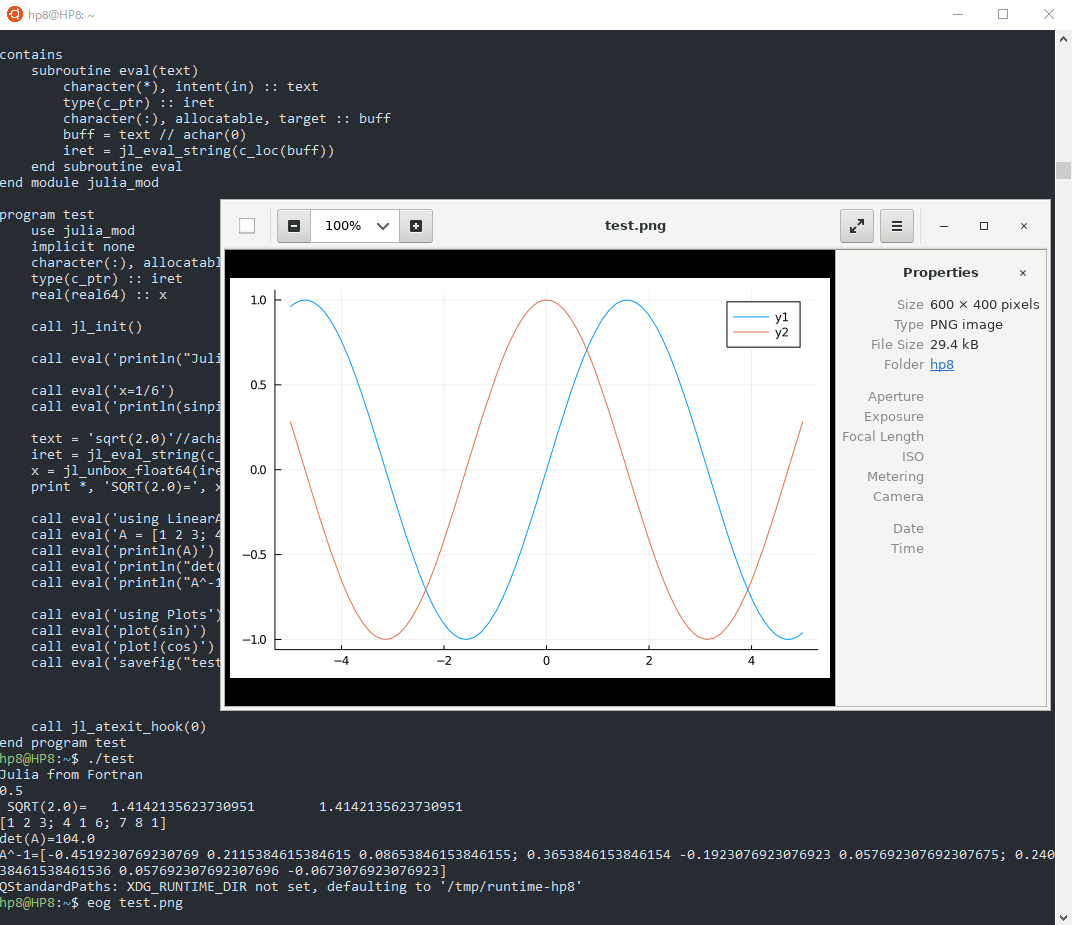前回の続きで、関数呼び出し、配列受け渡しなどの例題をやってみました。
一応、配列構造体を定義してみました。しかしコンパイル時の定数で構造が変わるようなので、よく分かりません。
しかし構造体などをきちんと定義していないので、ちゃんとしたものにはなっていません。
fortran66.hatenablog.com
配列は、Fortran の allocatable 型にしろ、Julia の Array にしろ、データの前に次元やサイズの情報のヘッダーがついているので、そこを何とかしなければならないのですが、めんどくさいのでちゃんとしていません。
また、C 言語の例題では Julia のガベージ・コレクション (GC) の動作のコントロールをマクロを利用してやっているのですが、そこは難しいので、気になる場合は Fortran で Julia 側で確保したメモリー領域をいじる場合には GC を停止させればいいのではないかと思います。インターフェースは作っておきました。
module julia_mod
use, intrinsic :: iso_fortran_env
use, intrinsic :: iso_c_binding
implicit none
type, bind(c) :: jl_array_t
type(c_ptr) :: dat
type(c_ptr) :: flags
integer(c_int16_t) :: elsize
integer(c_int32_t) :: offset
integer(c_size_t) :: nrows
integer(c_size_t) :: ncols
end type jl_array_t
type(c_ptr) :: jl_base_module
bind(c, name = 'jl_base_module') :: jl_base_module
type(c_ptr) :: jl_int8_type
bind(c, name = 'jl_int8_type') :: jl_int8_type
type(c_ptr) :: jl_int16_type
bind(c, name = 'jl_int16_type') :: jl_int16_type
type(c_ptr) :: jl_int32_type
bind(c, name = 'jl_int32_type') :: jl_int32_type
type(c_ptr) :: jl_int64_type
bind(c, name = 'jl_int64_type') :: jl_int64_type
type(c_ptr) :: jl_float16_type
bind(c, name = 'jl_float16_type') :: jl_float16_type
type(c_ptr) :: jl_float32_type
bind(c, name = 'jl_float32_type') :: jl_float32_type
type(c_ptr) :: jl_float64_type
bind(c, name = 'jl_float64_type') :: jl_float64_type
interface
subroutine jl_init() bind(c, name = 'jl_init__threading')
end subroutine jl_init
subroutine jl_atexit_hook(status) bind(c, name = 'jl_atexit_hook')
import
integer(c_int), value :: status
end subroutine jl_atexit_hook
type(c_ptr) function jl_eval_string(pstr) bind(c, name = 'jl_eval_string')
import
type(c_ptr), value :: pstr
end function jl_eval_string
real(real64) function jl_unbox_float64(ptr) bind(c, name = 'jl_unbox_float64')
import
type(c_ptr), value :: ptr
end function jl_unbox_float64
type(c_ptr) function jl_box_float64(x) bind(c, name = 'jl_box_float64')
import
real(real64), value :: x
end function jl_box_float64
real(real32) function jl_unbox_float32(ptr) bind(c, name = 'jl_unbox_float32')
import
type(c_ptr), value :: ptr
end function jl_unbox_float32
type(c_ptr) function jl_box_float32(x) bind(c, name = 'jl_box_float32')
import
real(real32), value :: x
end function jl_box_float32
real(int64) function jl_unbox_int64(ptr) bind(c, name = 'jl_unbox_int64')
import
type(c_ptr), value :: ptr
end function jl_unbox_int64
type(c_ptr) function jl_box_int64(x) bind(c, name = 'jl_box_int64')
import
real(int64), value :: x
end function jl_box_int64
real(int32) function jl_unbox_int32(ptr) bind(c, name = 'jl_unbox_int32')
import
type(c_ptr), value :: ptr
end function jl_unbox_int32
type(c_ptr) function jl_box_int32(x) bind(c, name = 'jl_box_int32')
import
real(int32), value :: x
end function jl_box_int32
type(c_ptr) function jl_ptr_to_array_1d(typ, pdata, sz, own_buffer) bind(c, name = 'jl_ptr_to_array_1d')
import
type(c_ptr), value :: typ
type(c_ptr), value :: pdata
integer(c_size_t), value :: sz
integer(c_int) , value :: own_buffer
end function jl_ptr_to_array_1d
type(c_ptr) function jl_ptr_to_array(typ, pdata, dims, own_buffer) bind(c, name = 'jl_ptr_to_array')
import
type(c_ptr), value :: typ
type(c_ptr), value :: pdata
type(c_ptr), value :: dims
integer(c_int) , value :: own_buffer
end function jl_ptr_to_array
type(c_ptr) function jl_apply_array_type(typ, n) bind(c, name = 'jl_apply_array_type')
import
type(c_ptr), value :: typ
integer(c_size_t), value :: n
end function jl_apply_array_type
type(c_ptr) function jl_alloc_array_1d(typ, n) bind(c, name = 'jl_alloc_array_1d')
import
type(c_ptr), value :: typ
integer(c_size_t), value :: n
end function jl_alloc_array_1d
type(c_ptr) function jl_alloc_array_2d(typ, nr, nc) bind(c, name = 'jl_alloc_array_2d')
import
type(c_ptr), value :: typ
integer(c_size_t), value :: nr, nc
end function jl_alloc_array_2d
type(c_ptr) function jl_alloc_array_3d(typ, nr, nc, nz) bind(c, name = 'jl_alloc_array_3d')
import
type(c_ptr), value :: typ
integer(c_size_t), value :: nr, nc, nz
end function jl_alloc_array_3d
type(c_ptr) function jl_arrayref(iarr, n) bind(c, name = 'jl_arrayref')
import
type(c_ptr), value :: iarr
integer(c_size_t), value :: n
end function jl_arrayref
type(c_funptr) function jl_get_global(modu, psymbol) bind(c, name = 'jl_get_global')
import
type(c_ptr), value :: modu
type(c_ptr), value :: psymbol
end function jl_get_global
type(c_ptr) function jl_symbol(ptext) bind(c, name = 'jl_symbol')
import
type(c_ptr), value :: ptext
end function jl_symbol
type(c_ptr) function jl_call(pfunc, pargs, nargs) bind(c, name = 'jl_call')
import
type(c_funptr), value :: pfunc
type(c_ptr), value :: pargs
integer(c_int32_t), value :: nargs
end function jl_call
type(c_ptr) function jl_call0(pfunc) bind(c, name = 'jl_call0')
import
type(c_funptr), value :: pfunc
end function jl_call0
type(c_ptr) function jl_call1(pfunc, parg) bind(c, name = 'jl_call1')
import
type(c_funptr), value :: pfunc
type(c_ptr), value :: parg
end function jl_call1
type(c_ptr) function jl_call2(pfunc, parg1, parg2) bind(c, name = 'jl_call2')
import
type(c_funptr), value :: pfunc
type(c_ptr), value :: parg1, parg2
end function jl_call2
type(c_ptr) function jl_call3(pfunc, parg1, parg2, parg3) bind(c, name = 'jl_call3')
import
type(c_funptr), value :: pfunc
type(c_ptr), value :: parg1, parg2, parg3
end function jl_call3
end interface
contains
subroutine eval(text, iret)
character(*), intent(in) :: text
type(c_ptr), intent(out), optional :: iret
character(:), allocatable, target :: buff
type(c_ptr) :: kret
buff = text // achar(0)
kret = jl_eval_string(c_loc(buff))
if (present(iret)) iret = kret
end subroutine eval
function jl_get_function(modu, namen)
type(c_ptr), value :: modu
character(*), intent(in) :: namen
type(c_funptr) :: jl_get_function
character(:), allocatable, target :: text
text = namen // achar(0)
jl_get_function = jl_get_global(modu, jl_symbol(c_loc(text)))
end function jl_get_function
end module julia_mod
program array_test
use julia_mod
implicit none
real(real64), parameter :: pi = 4 * atan(1.0_real64)
character(:), allocatable, target :: text
type(c_ptr) :: iret, argument, iarr, jarr, iatyp
real(real64) :: x
type(c_funptr) :: ifun
integer, allocatable, target :: m(:)
integer, pointer :: m2(:)
integer :: i
integer(int64) :: n
type(jl_array_t), pointer :: parr
character, pointer :: chars(:)
call jl_init()
call eval('println("Julia from Fortran")')
text = 'sqrt(2.0)'//achar(0)
iret = jl_eval_string(c_loc(text))
x = jl_unbox_float64(iret)
print *, 'SQRT(2.0)=', x, sqrt(2.0_real64)
ifun = jl_get_function(jl_base_module, "sinpi")
argument = jl_box_float64(1.0_real64 / 6.0_real64)
iret = jl_call1(ifun, argument)
x = jl_unbox_float64(iret)
print *, 'Julia: sinpi(1/6)', x, ' Fortran:sin(pi/6)', sin(pi / 6)
n = 20
m = [(i, i = 1, n)]
iatyp = jl_apply_array_type(jl_int32_type, 1_int64)
iarr = jl_ptr_to_array_1d(iatyp, c_loc(m), n, 0)
print '(a, *(i3))', 'array 1:n ', m
ifun = jl_get_function(jl_base_module, "reverse!")
iret = jl_call1(ifun, iarr)
print '(a, *(i3))', 'reverse! ', m
ifun = jl_get_function(jl_base_module, "reverse")
jarr = jl_call1(ifun, iarr)
call c_f_pointer(jarr, parr)
call c_f_pointer(parr%dat, m2, [n])
print '(a, *(i3))', 'reverse ', m2
call jl_atexit_hook(0)
end program array_test
実行結果
- sqrt(2) を Julia 側と Fortran 側の両方で計算しています。
- Julia 側では π を単位とする sinpi 関数で sinpi(1/6) を、Fortran 側では sin(π/6.0) を計算しています。π を単位とする計算は多くなされますが、初めからπを基準としておくと精度よく計算できることが知られています。Fortran202X で Fortran にも同様な関数が導入される予定です。
- Fortran 側の要素数 n(=20) 個の整数配列を、Julia 側に渡してINTENT(IN OUT) 的に値の並びを反転させました。
- 反転した整数配列を intent(in) 的に Julia 側に渡して、もう一度反転して元に戻した配列を関数の戻り値として Fortran 側の配列で受け取りました。
hp8@HP8:~/forjulia$ gfortran -o test -fPIC -L$JULIA_DIR/lib -Wl,-rpath,$JULIA_DIR/lib j.f90 -ljulia
hp8@HP8:~/forjulia$ ./test
Julia from Fortran
SQRT(2.0)= 1.4142135623730951 1.4142135623730951
Julia: sinpi(1/6) 0.50000000000000000 Fortran:sin(pi/6) 0.49999999999999994
array 1:n 1 2 3 4 5 6 7 8 9 10 11 12 13 14 15 16 17 18 19 20
reverse! 20 19 18 17 16 15 14 13 12 11 10 9 8 7 6 5 4 3 2 1
reverse 1 2 3 4 5 6 7 8 9 10 11 12 13 14 15 16 17 18 19 20
docs.julialang.org
















